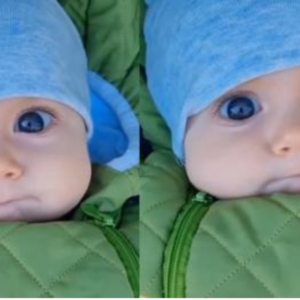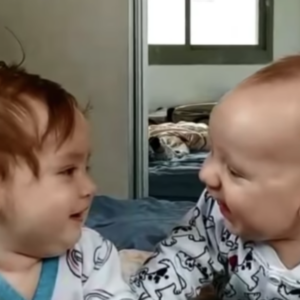Gus was 10 months old when my concerns were no longer brushed off with the standard line of ‘all babies develop at their own pace.’ At 10 months old, our baby, our third son, could not hold himself in a sitting position. He was not doing much of anything, actually, other than brightening our day consistently with his infectious ear-to-ear smile and glimmering baby blues. There was no clapping, no waving bye-bye, no cooing—but a persona so pure and healing his very presence could probably heal even the deepest of wounds.
I had a perfectly healthy pregnancy and a dream hypnobirth delivery where Gus entered this world so calmly it hardly felt real. He latched right away and we experienced that newborn bliss high for a solid 24-hours. The next day, at home, things felt different. I felt as though he had forgotten how to eat. His latch was so off it seemed as though he lacked the primal instinct to, well, suck. Feedings took hours and when he finally did get off the breast, he would spit up so much it seemed like he was immediately starving again. This cycle went on and on.

At his 1-week check-up, I expressed concern and our pediatrician (who we love very much) declared Gus likely had severe acid reflux. I immediately eliminated all dairy and soy from my diet but things didn’t get much better for him. In fact, they kept getting worse. By his 1-month well-check, my once plump little newborn was looking quite frail. Not only was he not gaining weight, but he was losing it. We were immediately sent to the ER for concerns of ‘Failure to Thrive.’ We spent a few days at the children’s hospital where Gus was repeatedly poked and prodded with test after test. He had tests for things I had never heard of, but within seconds of a quick internet search would feel a wave of nausea and heartache rush over me. THANKFULLY—they found nothing..
We began giving him a hypoallergenic formula while at the hospital to help with quick weight gain and also met with a lactation consultant (for the third time since his birth) to express my concern with the way he latched. She sweetly recommended I simply try different positions and confirmed no tongue/lip ties were present. I was so out of sorts at this point. I felt as if everything I knew about mothering went out the window. I had feelings of guilt rush over me and embarrassment to admit to even hospital staff that we were there because of ‘failure to thrive.’ I felt my baby was starving and it WAS MY FAULT. Surely it couldn’t just be due to the way he was positioned during feedings.
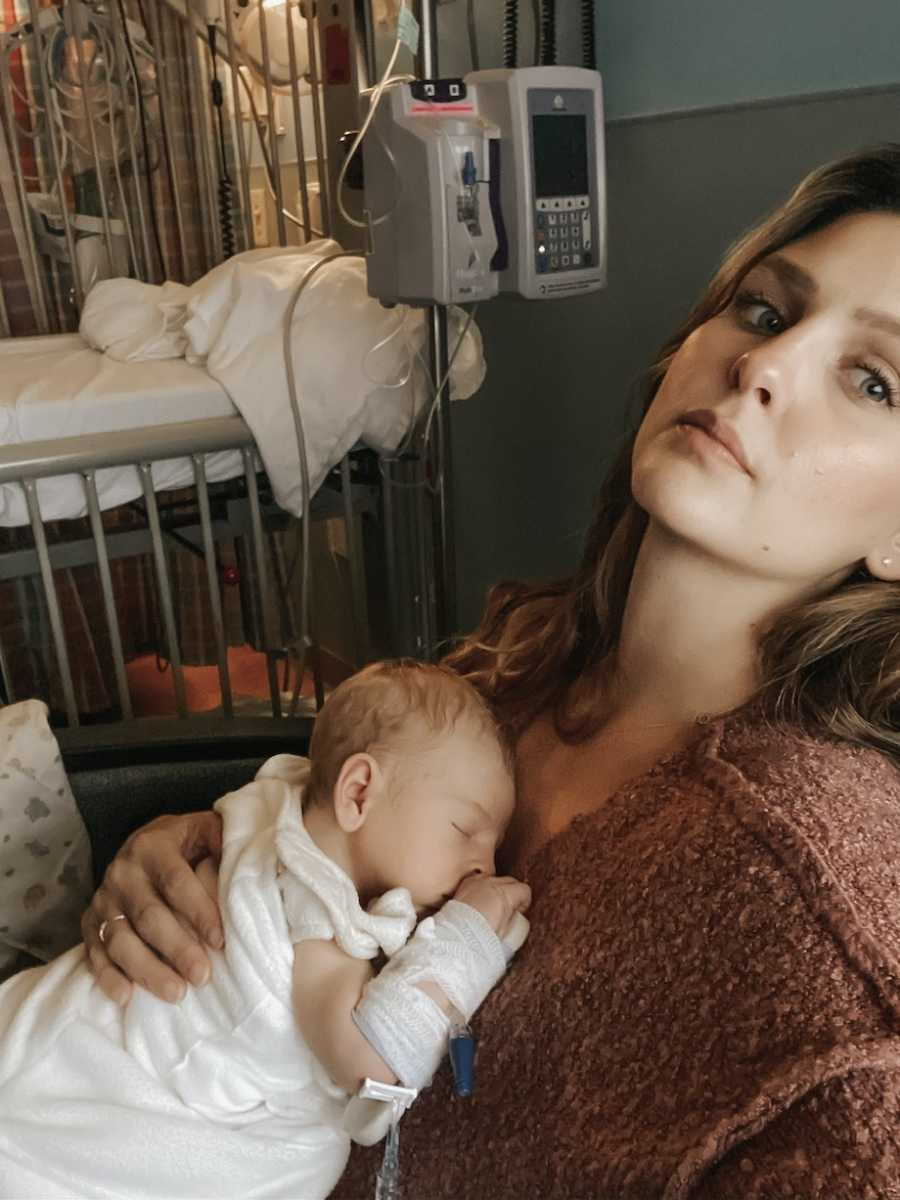
We were getting no answers and therefore, no direction. During our stay there, I did find comfort in our third shift nurse, though. He was a tall middle-aged man, so very kind, and so evidently good at what he did I looked forward to his check-ins just so we could engage in a good heart-felt chat. I can still remember him getting down on his knee beside me as I was rocking Gus to sleep, confused and worried, made eye contact with me, and said, ‘I’m really not supposed to interject my opinion here, but I just want to tell you that we have a severely Autistic daughter. It is not the life we planned for but she is a joy, the light of our lives, and it gets easier.’
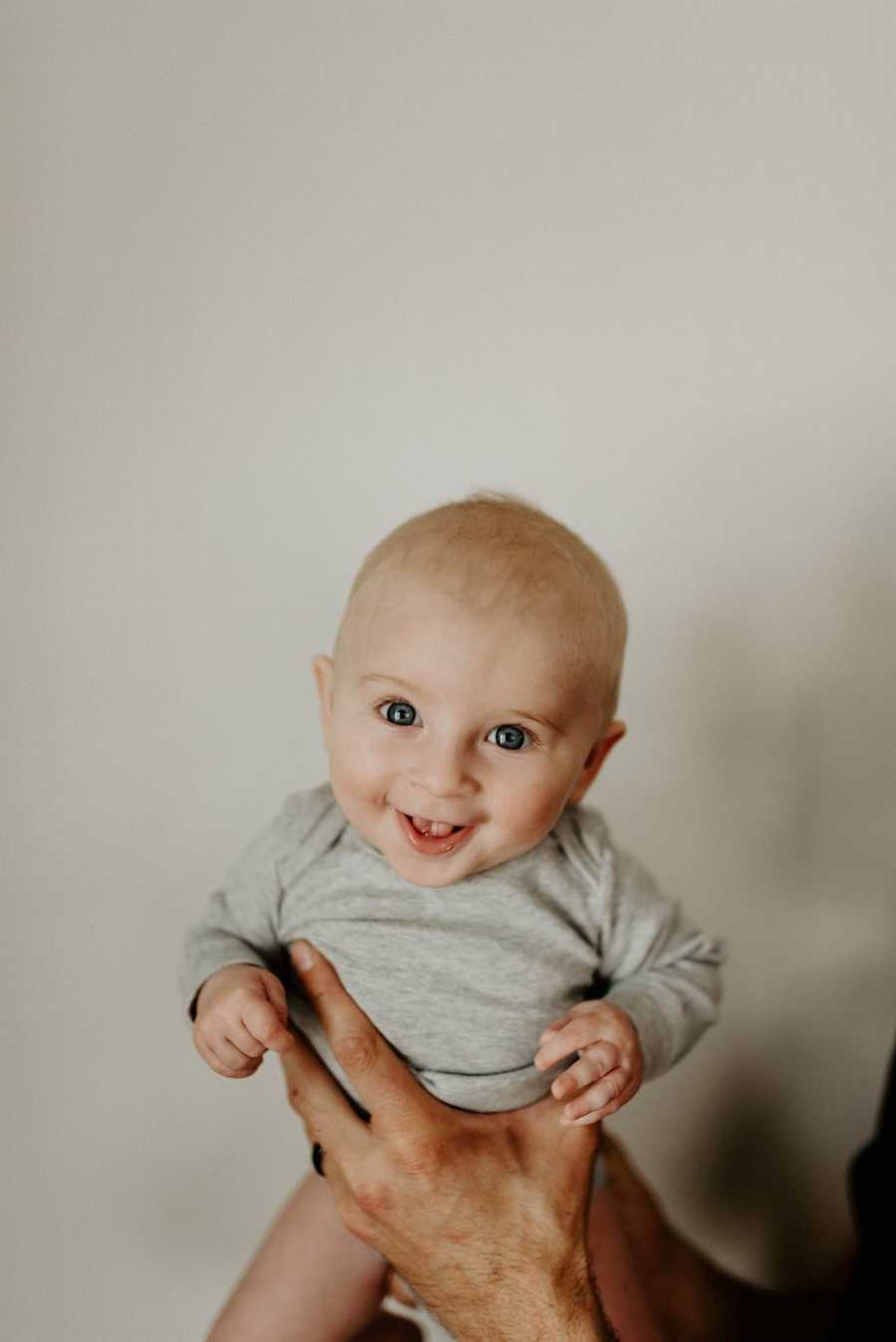
I remember looking at him puzzled… He then responded with, ‘I believe your son has Autism.’ Well, he was wrong about that diagnosis. But he wasn’t that wrong. And his empathy and compassion while leveling up with me still to this day makes me teary-eyed.

We left the hospital with a box of hypoallergenic formula and still no clear answers other than the premonition of ‘severe acid reflux’ and a recommendation for him to begin medication for it. Months went by and eventually I gave up breastfeeding entirely and exclusively bottle-fed Gus the ridiculously expensive hypoallergenic formula he was on while in the hospital. He still forcefully spit up after every feeding, and instead of celebrating pounds gained each month, we were celebrating ounces gained. Through all of this, I still couldn’t help but notice the way he almost chewed the bottle to get milk out versus sucking. We were fortunate, though, even in the pits of his feeding difficulties, we never had to take the route of needing a g-tube. And, that despite all his feeding misery–he was always so happy.
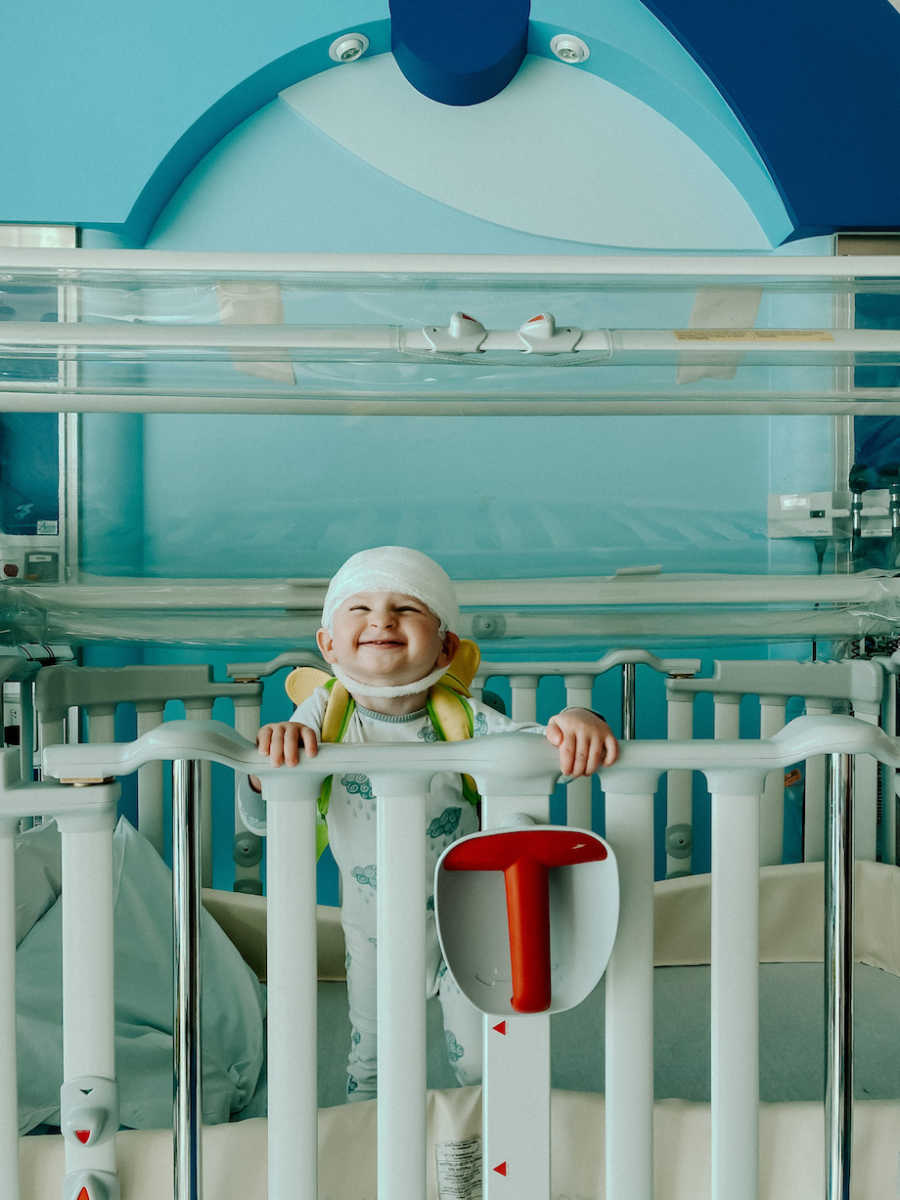
Fast forward, months were going by and not only was my baby very slowly gaining weight, but he was not meeting any of the milestones I so vividly remember witnessing with his two older brothers. My sweet husband would calm my concerns by stating he was likely just behind due to his rough start and failure to thrive experience. But the intuition in me felt it was something so much greater became hard to ignore. At about 6 months, I started really paying attention to his movements, which to me felt very rigid. His left eye began to wander several times throughout the day and physically, he could not do much other than roll back and forth and bounce up and down while being held.
At 7-8 months, I started to notice a jerkiness in his movements. They were mild, but working as a Psychologist in Traumatic Brain Injury for 7 years, I was pretty tuned-in to movement like this… ‘I’ve seen this before,’ I would think to myself. That’s when I became pretty obsessive with Googling symptoms. Every night while the house was asleep I would frantically type in ‘jerky movements in 8-month-old,’ ‘inability to sit, pull self up, no babbling.’ At one point, I had thoroughly convinced myself he had cerebral palsy. At the end of his 9th month, I had enough of my self-tortuous symptom searches and decided to call his pediatrician to set up an appointment outside of his typical well-checks.

When we got in, I listed, with adamancy, ALL of my concerns, and dropped the ‘intuition’ word. I flat out stated my motherly intuition says something is not right, something neurological is happening. I know first-hand the importance of early intervention and I wanted answers, now. Our doctor played with him sweetly, like he always had, bounced him up and down and laughed at that infectious smile Gus was so good at delivering before saying, ‘You’re right, I believe something neurological is going on with your son and we should refer him to a neurologist right away.’
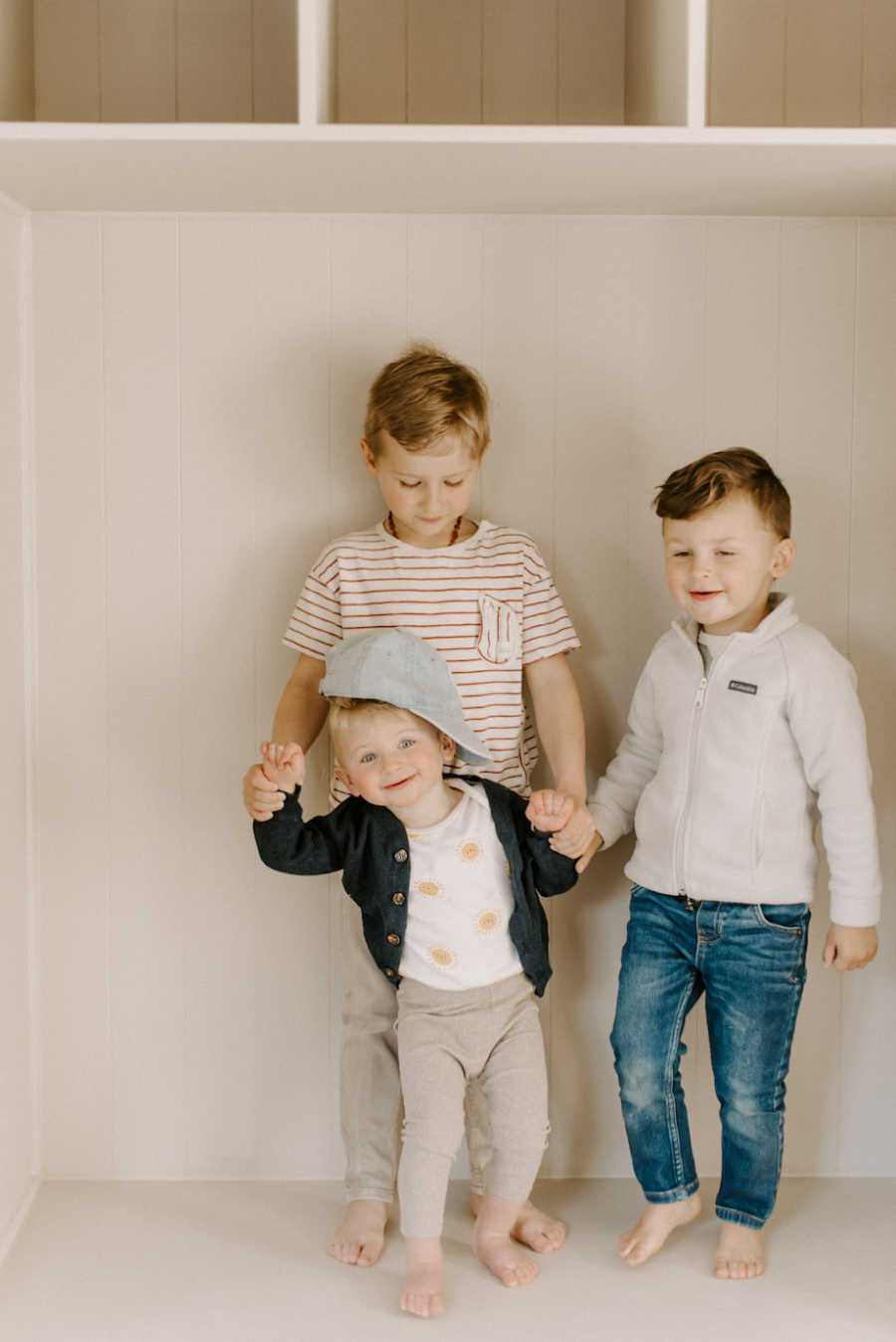
INSTANT RELIEF. I felt instant relief. Not because I wanted this, but because I had felt it and had been alone with it for so long, and someone finally just validated those feelings. After Gus’s neurology appointment, things began moving very quickly. Before even officially knowing what was going on, he was scripted OT, PT, and Speech Therapy services, which we immediately began. His jerkiness was pretty evident to all, as was his complete lack of verbal/nonverbal communication (no babble, cooing, or even pointing). A genetics screen and MRI were also ordered after his initial neurology appointment. A genetics counselor called in at around his first birthday to let us know what things were on the docket, so to speak, for him to be tested for. She listed things I had heard of before, such as Prader Willis Syndrome, Down syndrome (my incredible brother has Down syndrome, so I knew right away this was not the case for Gus), and a few others before mentioning Angelman Syndrome. I was intrigued. I had never heard of this before despite feeling pretty well-versed in the special needs community.
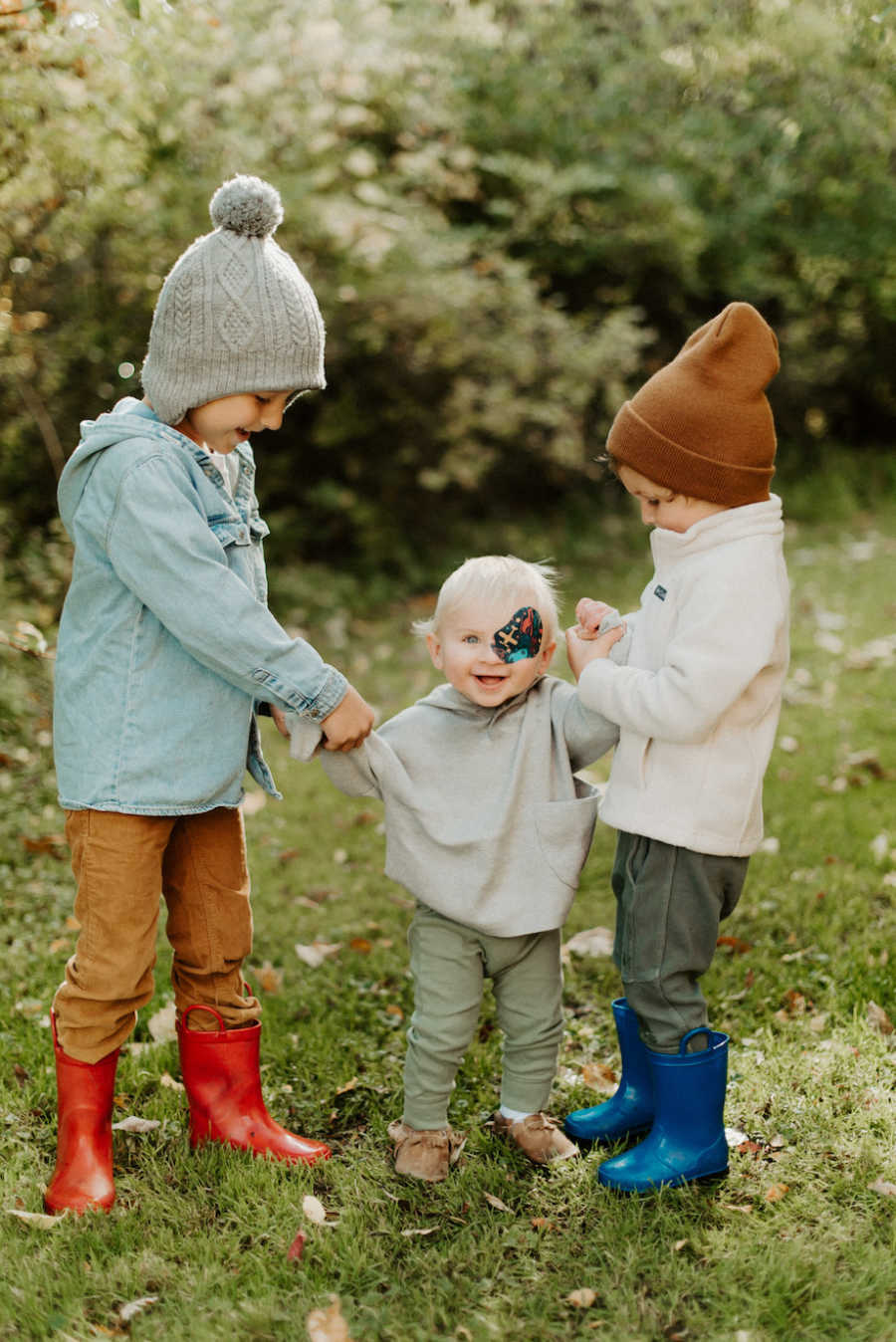
The list went on and on and I felt as though I could check off every box as I went down. On October 26, following an MRI and full genetics screen earlier that month, it was confirmed. Our beautiful, perfect Gus had Angelman Syndrome, a microdeletion on the 15th chromosome that affects approximately 1 in 15,000. I sat there in my emotions, feeling such sweet relief but grieving at the same time. It was a rush but it didn’t last too long, and honestly, I believe it’s because I had known for so long there was something special with our boy. I had grieved the loss of the life I thought my son was going to have long ago and was almost immediately able to shift gears into just celebrating it. Celebrating his differences. Celebrating what has uniquely made himself, him; and thanking God for entrusting us with him and his special genetics.

I will not pretend this diagnosis has been easy, and I am not naïve to the challenges that come along with it. Since Gus’s diagnosis (he is now 20 months old), he has made drastic gross motor gains, but we’ve also experienced the heartache of seizure activity – another very common symptom that goes along with the syndrome. He fortunately has grown out of his reflux/spitting up and eats solid foods with little concern, though he does still tend to chew vs. suck when he uses his sippy cup. Gus cannot walk yet or stand independently, but he can scale furniture and keep up with his brothers easily thanks to a turbo-style crawl.
He is strong, and I know he will walk one day. He does babble now, a lot, and even musters out ‘mama’ from time to time, despite being told he may never speak at all. Gus continues to communicate in a way that should be more common to us all, with his whole body, and with so much love and meaning behind everything he ‘says.’ He is a super-fan of hugging, and by hugging, I mean wrapping his little arms around your neck, pressing his cheek against yours, and squeezing you so tightly you’re sure your heart could burst at any moment. His mere presence is healing. He is joyous. And we are so, so lucky.
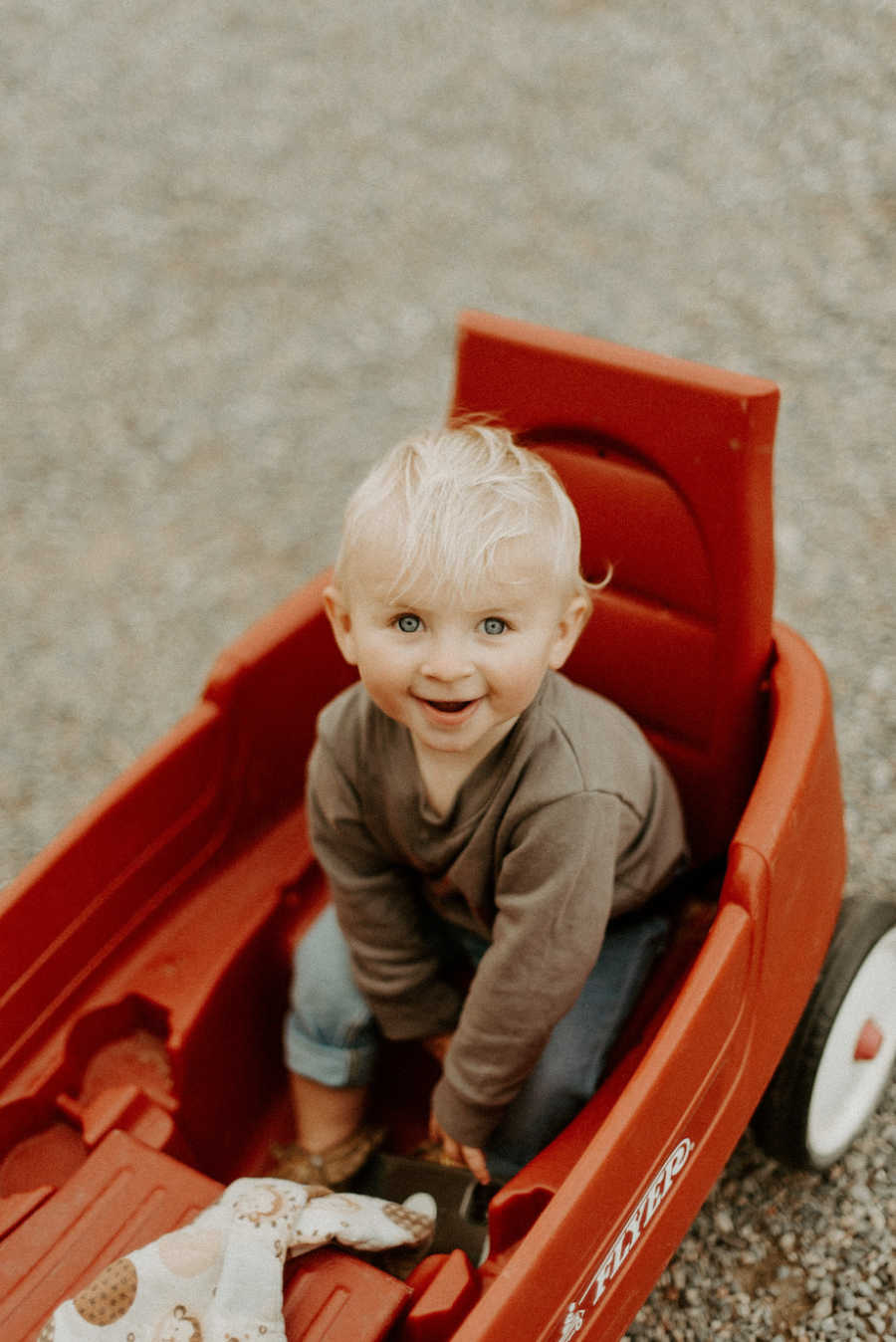
I think what has been another blessing throughout all of this is our ability to easily connect with other Angelman families. Social media has really served as a positive outlet with regard to these connections. That wasn’t the case years ago for people like my mother, who felt alone while navigating life with her own special needs child. It was incredibly comforting to hear other family’s stories leading up to their child’s diagnosis because so much of their stories paralleled our own. Every day, I look forward to watching the new and exciting things these Angelman kiddos and their families are up to; and, yes, it’s comforting to have others resonate with you in your darkness on those difficult days too.
Just has the highly recommended ‘Welcome to Holland’ read suggests, this indeed wasn’t the ‘vacation’ destination we had planned for. This isn’t the life we had planned for. But it is, without a doubt, the life we would choose over and over again. To imagine a life differently at this point is heartbreaking because Gus was meant for us, just as he is. We have learned so much from him in his 20 months of life thus far and get the honor of continuing this learning alongside him, for a lifetime.”

